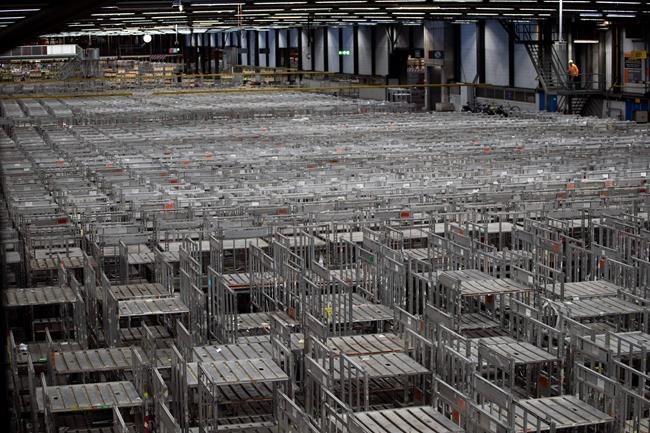
Empty racks are seen at flower auctioneer Royal FloraHolland in Aalsmeer, Netherlands, Thursday, March 19, 2020. Sales at major Dutch growers have slumped, forcing farmers to destroy their flower crops in this busy spring season when bulb fields erupt into color. With lockdowns and border restrictions around the world because of the coronavirus the Netherlands' multibillion dollar flower industry has slumped. For many people the new coronavirus pandemic causes mild or moderate symptoms but for some it can cause severe illness. (AP Photo/Peter Dejong)
Republished March 20, 2020 - 3:16 AM
Original Publication Date March 20, 2020 - 2:06 AM
LISSE, Netherlands - The pots of chrysanthemums stacked in Henk van der Slot’s barn in the Netherlands bulb fields were supposed to decorate St. Peter’s Square at the Vatican over Easter.
But with border restrictions and lockdowns spreading around the globe as governments fight the coronavirus pandemic, the pope will have to go without his usual donation of Dutch flowers this year.
He’s not the only one.
"The coronavirus is a disaster for the Dutch flower industry ... 85% of the turnover at our marketplace … is gone,” said Michel van Schie, press officer at Royal FloraHolland, a co-operative of growers that trades some 12 billion plants and flowers each year.
That's a huge hit for the Dutch flower industry, whose exports last year were worth more than 6 billion euros. According to government figures, the Netherlands has a 44% share of the world trade in floriculture products and accounts for 77% of flower bulbs sold worldwide.
Some Dutch farmers have resorted to giving away tulips to health care workers as a token of appreciation for their work.
It’s not only growers in the Netherlands who are hurting. The pain has spread to farmers elsewhere in Europe and to African nations like Kenya and Ethiopia which have developed significant flower industries.
In Kenya the grading hall at Maridadi Flowers farm, where 120 people usually work, is deserted. The few staff still there cut roses and load them onto carts that are pushed to a dumping site where huge mounds of discarded flowers — 230,000 to 250,000 each day —pile up.
Owner Jack Kneppers, a Dutchman who has been working in Kenya for decades, said about 80% of his staff of 720 is now at home. He is keeping a skeleton staff to maintain the plants at the farm near the shores of Lake Naivasha, 90 kilometres (55 miles) north of the capital, Nairobi.
“This is costing us about half a million dollars a month to maintain the company,” Kneppers said. “If this continues for much longer we have to start laying off people because we can’t afford this.”
At Royal FloraHolland's cavernous auction facility in Aalsmeer near Amsterdam, rows of flower racks stand empty. Workers driving electric trolleys shift boxes of flowers around, but only a fraction of the usual numbers are being traded.
The co-operative, which had turnover last year of 4.7 billion euros, is asking suppliers to send only around 25% of their usual number of flowers to be auctioned to prevent tipping unsold flowers into shredding machines.
Frans van der Slot, Henk’s cousin, is keeping his tulips in cold storage for as long as possible in an attempt to ride out the worst of the slump. He's hoping sales will recover around Easter on April 12, but if there's no rebound, he will have to dump most of his harvest.
Earlier this week he threw out a batch of bulbs because it wasn't economically viable to plant them.
“They fed them to cows,” he said. “They were first-class bulbs.”
The coronavirus crisis couldn’t have hit at a worst time.
In the peak spring season, fields around the Netherlands burst into vibrant colours as tulips and other flowers bloom. Sunday is Mother’s Day in Britain, but even that has not helped an industry brought to its knees.
Kenya's farmers sell some 70% of their produce to Europe.
"As we speak right now figures are changing every day, but by yesterday we were operating at 30%, that means 70% lower than we have ever done,” said Clement Tulezi, CEO of the Kenya Flower Council.
Kneppers says it's the worst he's ever seen.
One of his workers, Carol Gikundi, a single mom with three children who also cares for her mother, is worried.
"We are scared our jobs,” she said. "We’re scared also for our employees because all our dependents are currently looking up to us and we are not certain of our jobs due to the outbreak.”
In the Netherlands, Frans van der Slot has set up a stall outside his farm to sell flowers he can’t send to auction.
A Dutch tricolour flag flaps in the wind above a sign urging passers-by to “Buy local tulips Now.” A bunch of 50 flowers costs 5 euros ($5.40), far less than they sell for in stores and markets across the Netherlands.
“Stopping isn’t an option,” said Van der Slot. “Then I have to let my business go bankrupt and I lose all my savings.”
____
Mwihia reported from Naivasha, Kenya.
___
The Associated Press receives support for health and science coverage from the Howard Hughes Medical Institute’s Department of Science Education. The AP is solely responsible for all content.
News from © The Associated Press, 2020